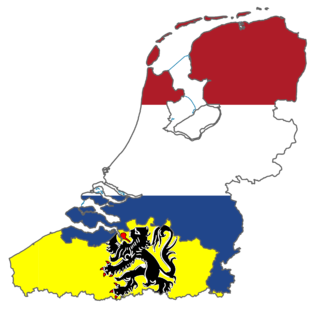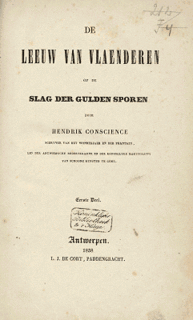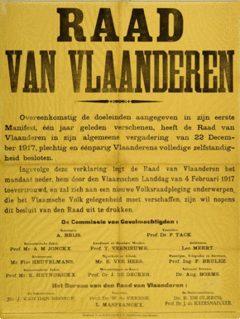
Flanders is the Dutch-speaking northern portion of Belgium and one of the communities, regions and language areas of Belgium. However, there are several overlapping definitions, including ones related to culture, language, politics and history, and sometimes involving neighbouring countries. The demonym associated with Flanders is Fleming, while the corresponding adjective is Flemish. The official capital of Flanders is Brussels, although the Brussels Capital Region has an independent regional government, and the government of Flanders only oversees the community aspects of Flanders life in Brussels such as (Flemish) culture and education.

West Flanders is the westernmost province of the Flemish Region, in Belgium. It is the only coastal Belgian province, facing the North Sea to the north. It has land borders with the Netherlands to the northeast, the Flemish province of East Flanders to the east, the Walloon province of Hainaut in the southeast and France to the west. Its capital is Bruges (Brugge). Other important cities are Kortrijk in the south and Ostend on the coast, Roeselare and Ypres (Ieper). The province has an area of 3,125 km2 which is divided into eight administrative districts (arrondissementen) containing 64 municipalities.

Zeelandic Flanders is the southernmost region of the province of Zeeland in the south-western Netherlands. It lies south of the Western Scheldt that separates the region from the remainder of Zeeland and the Netherlands to the north. Zeelandic Flanders is bordered to the south by Belgium.

The Tour of Flanders, also known as De Ronde, is an annual road cycling race held in Belgium every spring. The most important cycling race in Flanders, it is part of the UCI World Tour and organized by Flanders Classics. Its nickname is Vlaanderens Mooiste. First held in 1913, the Tour of Flanders had its 100th edition in 2016.

The Flemish Movement is the political movement for greater autonomy of the Belgian region of Flanders, for protection of the Dutch language, for the overall protection of Flemish culture and history, and in some cases, for splitting from Belgium and forming an independent state.

Greater Netherlands or Dietsland ("Dutchland") is a hypothetical monolingual polity formed by fusing the two Dutch-speaking regions of Flanders and the Netherlands. The concept was originally developed by Pieter Geyl, who argued that the two only separated during the Eighty Years' War against Spain in the 16th century.
Dutch-language literature comprises all writings of literary merit written through the ages in the Dutch language, a language which currently has around 23 million native speakers. Dutch-language literature is the produce of Netherlands, Belgium, Suriname, the Netherlands Antilles and of formerly Dutch-speaking regions, such as French Flanders, South Africa, and Indonesia. The Dutch East Indies, as Indonesia was called under Dutch colonization, spawned a separate subsection in Dutch-language literature. Conversely, Dutch-language literature sometimes was and is produced by people originally from abroad who came to live in Dutch-speaking regions, such as Anne Frank and Kader Abdolah. In its earliest stages, Dutch-language literature is defined as those pieces of literary merit written in one of the Dutch dialects of the Low Countries. Before the 17th century, there was no unified standard language; the dialects that are considered Dutch evolved from Old Frankish. A separate Afrikaans literature started to emerge during the 19th century, and it shares the same literary roots as contemporary Dutch, as Afrikaans evolved from 17th-century Dutch. The term Dutch literature may either indicate in a narrow sense literature from the Netherlands, or alteratively Dutch-language literature.

The Vlaams Nationaal Verbond, widely known by its acronym VNV, was a Flemish nationalist political party active in Belgium between 1933 and 1945. It became the leading force of political collaboration in Flanders during the German occupation of Belgium in World War II. Authoritarian by inclination, the party advocated the creation of a "Greater Netherlands" (Dietsland) combining Flanders and the Netherlands.

Staf De Clercq was a Flemish nationalist collaborator, co-founder and leader of the Flemish nationalist Vlaamsch Nationaal Verbond.
Flemish literature is literature from Flanders, historically a region comprising parts of present-day Belgium, France and the Netherlands. Until the early 19th century, this literature was regarded as an integral part of Dutch literature. After Belgium became independent from the Netherlands in 1830, the term Flemish literature acquired a narrower meaning and refers to the Dutch-language literature produced in Belgium. It remains a part of Dutch-language literature.

Cyriel Verschaeve was a Flemish-nationalist priest and writer who collaborated with the Nazis during the Second World War. He was recognised as the spiritual leader of Flemish nationalism by the ideology's adherents.

Flemish painting flourished from the early 15th century until the 17th century, gradually becoming distinct from the painting of the rest of the Low Countries, especially the modern Netherlands. In the early period, up to about 1520, the painting of the whole area is typically considered as a whole, as Early Netherlandish painting. This was dominated by the Flemish south, but painters from the north were also important. Dutch and Flemish Renaissance painting, of which Antwerp became the centre, covers the period up to about 1580 or later, by the end of which the north and south Netherlands had become politically separated. Flemish Baroque painting was especially important in the first half of the 17th century, dominated by Rubens.

Michiel de Swaen was a surgeon and a rhetorician from the Southern Netherlands.
Fredegardus Jacobus Josephus (Jef) van de Wiele was a Belgian Flemish Nazi politician. During the Nazi occupation of Belgium he became notorious as the leader of the most virulently pro-Nazi wing of Flemish politics.
René Lagrou (1904–1969) was a Flemish-Belgian politician and collaborator with Nazi Germany.
The Flemish or Flemings are a Germanic ethnic group native to Flanders, in modern Belgium, who speak Flemish, but mostly use the Dutch written language. They are one of two principal ethnic groups in Belgium, the other being the French-speaking Walloons. Flemish people make up the majority of the Belgian population. Historically, all inhabitants of the medieval County of Flanders were referred to as "Flemings", irrespective of the language spoken. The contemporary region of Flanders comprises a part of this historical county, as well as parts of the medieval duchy of Brabant and the medieval county of Loon.

The Lion of Flanders, or the Battle of the Golden Spurs is a major novel first published in 1838 by the Belgian writer Hendrik Conscience (1812–83). An early example of the historical fiction genre, the Lion of Flanders focuses on the medieval Franco-Flemish War and the Battle of the Golden Spurs of 1302 in particular. It is written in Conscience's typical stylistic romanticism and has been described as the "Flemish national epic".

Flemish (Vlaams) also called Flemish Dutch (Vlaams-Nederlands), Belgian Dutch, or Southern Dutch (Zuid-Nederlands), is a Lower Franconian / Dutch dialect. It is spoken in the whole northern region of Belgium as well as French Flanders and the Dutch Zeelandic Flanders by approximately 6.5 million people. The term is used in at least five ways. These are:
- as an indication of Dutch written and spoken in Flanders including the Dutch standard language as well as the non-standardized dialects, including intermediate languages between dialect and standard. Some linguists avoid the term Flemish in this context and prefer the designation Belgian-Dutch or South-Dutch.
- as a synonym for the so-called intermediate language in Flanders region, the Tussentaal.
- as an indication for the non-standardized dialects and regiolects of Flanders region.
- as an indication of the non-standardized dialects of only the former County of Flanders, ie the current provinces of West Flanders and East Flanders, Zeelandic Flanders and Frans-Vlaanderen.
- as an indication of the non-standardized West Flemish dialects of the province of West Flanders, the Dutch Zeelandic Flanders and French Frans-Vlaanderen.
Karel Van Wijnendaele, pseudonym of Carolus Ludovicius Steyaert, was a pioneer of Flemish sports journalism. He was the founder and first organizer of the Tour of Flanders cycling classic.

Flemish Expressionism, also referred to as Belgian Expressionism, was one of the dominant art styles in Flanders during the interbellum. Influenced by artists like James Ensor and the early works of Vincent van Gogh, it was a distinct contemporary of German Expressionism. Contrary to the more rebellious and erotic nature of many German Expressionist works, the Flemish art of the School of Latem was more oriented towards the farming life, and was expressed in earthy colours and vigorous brushwork. It was also in general more oriented towards France and Brussels than to Germany, and incorporated elements of Fauvism and Cubism, for example the interest in "primitive" art, of both the ethnic and folk traditions. Flemish Expressionists like Spilliaert were more influenced by Ensor and Symbolism, or like Wouters were closer to the vibrant colours used by the Fauvists. The main proponents were Gust De Smet, Constant Permeke and Frits Van den Berghe.























